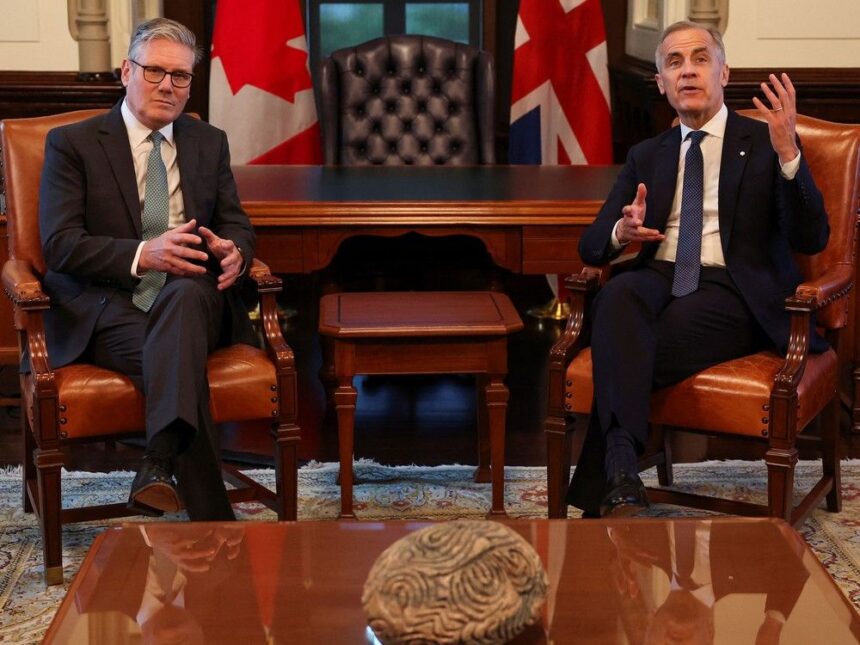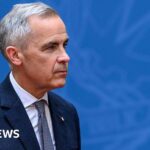I’ve just returned from London where the political mood has shifted dramatically under the new Starmer government. In meetings at Whitehall and the Canadian High Commission, officials spoke with renewed vigor about resetting UK-Canada trade relations after years of stalled negotiations.
“We’re starting from a position of mutual understanding,” a senior British trade official told me during a briefing that ran well beyond its scheduled time. “But make no mistake, this isn’t just picking up old papers and signing them.”
The arrival of Mark Carney as a key economic advisor to Prime Minister Keir Starmer has injected a distinctly Canadian perspective into Britain’s international trade strategy. As the former Bank of England and Bank of Canada governor settles into his advisory role, his fingerprints are already visible on the UK’s approach to trade with Commonwealth partners.
During an economic forum at Canada House in Trafalgar Square last week, Carney emphasized the complementary nature of the two economies. “We’re not looking at trade as a zero-sum game,” he explained. “The opportunities in green technology, financial services, and agricultural products create natural synergies between our markets.”
The previous Canada-UK Trade Continuity Agreement, hastily implemented after Brexit to maintain basic trade flows, expires next year. This temporary arrangement essentially copied the EU-Canada deal but was always intended as a stopgap measure until a more comprehensive bilateral agreement could be negotiated.
Data from Global Affairs Canada indicates that UK-Canada trade totaled approximately $33.7 billion in 2023, making Britain Canada’s third-largest trading partner. Yet experts believe this figure could grow substantially under a modernized agreement.
“The potential upside is enormous, particularly in emerging sectors,” explains Maria Demertzis, Senior Fellow at Bruegel, a Brussels-based economic think tank. “But the negotiators must address regulatory alignment issues that have prevented deeper integration.”
My conversations with Canadian exporters reveal substantial frustration with the current arrangement. Andrew Patterson, who ships specialty food products from British Columbia to UK markets, described the paperwork as “Byzantine” compared to pre-Brexit procedures. “We’re spending more on compliance than on actual product development,” he lamented.
The political dynamics have shifted dramatically since negotiations last faltered in 2022. Prime Minister Starmer has prioritized pragmatic trade relationships as part of his economic growth strategy, while Prime Minister Justin Trudeau faces mounting pressure to deliver economic wins ahead of Canada’s next federal election.
One potential sticking point remains agricultural market access. During a visit to a dairy farm in Quebec last month, I heard concerns about British demands for greater access to Canada’s protected dairy market. “We’ve already compromised too much in previous trade deals,” a dairy cooperative representative told me. “There’s very little appetite for further concessions.”
British negotiators, meanwhile, are pressing for improved access for UK financial services firms into Canadian markets—a sector where London still maintains significant competitive advantages despite Brexit disruptions.
Climate policy integration represents a newer dimension in the negotiations. Both governments have committed to aligning trade with climate goals, potentially including provisions on carbon border adjustments and green technology transfers.
“This could be the first major trade agreement that truly embeds climate considerations throughout,” says Catherine McKenna, former Canadian Minister of Environment and Climate Change. “But the implementation details will determine whether it’s meaningful or merely symbolic.”
Security considerations are also reshaping the economic relationship. With increased geopolitical tensions, both countries are reassessing supply chains for critical minerals and technologies. During a closed-door session at the Royal United Services Institute, defense analysts highlighted opportunities for deeper industrial cooperation in sectors with national security implications.
The renewed talks also signal Britain’s evolving post-Brexit strategy. After initially focusing on ambitious deals with larger economies like the United States and India, UK officials have pivoted toward what one advisor described as “achievable wins with trusted partners.”
For Canada, a comprehensive agreement with the UK could provide valuable leverage in other trade negotiations, particularly with the European Union.
As negotiating teams prepare for formal talks next month in Ottawa, the mood among stakeholders is cautiously optimistic. Technical working groups have already begun addressing regulatory issues in financial services, digital trade, and environmental standards.
“We’re not starting from scratch,” a Canadian trade official explained during a background briefing. “But we’re also not constrained by previous negotiating positions that led nowhere.”
The path to agreement remains challenging, with sensitive issues like intellectual property protection, pharmaceutical pricing, and government procurement likely to require creative compromises. Yet the political will on both sides appears stronger than at any point since Brexit.
As one British diplomat put it while walking me out after our interview: “Sometimes fresh faces allow everyone to save face when positions need to change.”
For businesses and consumers on both sides of the Atlantic, the stakes couldn’t be higher. A modernized trade agreement could reduce prices, expand choices, and create new opportunities—provided negotiators can navigate the complex political currents that have sunk previous attempts.






